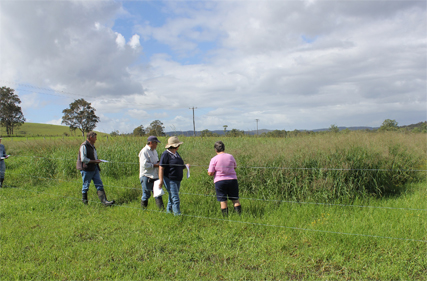 Following a cold and wet start to winter, Local Land Services is encouraging livestock producers to think about the feed requirements they will need through the colder months.
Following a cold and wet start to winter, Local Land Services is encouraging livestock producers to think about the feed requirements they will need through the colder months.
Hunter Local Land Services is running field days over the next week with a range of guest speakers to provide advice on how to meet these challenges.
Taree – Wednesday June 22
Gloucester – Tuesday June 28
Kempsey – Wednesday June 29
Traditionally, a feed gap is likely to occur in late winter when pasture quality does not meet livestock energy requirements as the days are cooler and daylight is shorter, resulting in slower pasture growth.
However, producers are being warned the traditional winter feed gap could occur earlier this year with floods, ongoing wet weather and now cold conditions compounding pasture and feed supply issues.
Hunter Local Land Services Agronomist Peter Beale is urging producers to take the time to forward plan so they can make on farm management decisions early.
“During winter it is important that landholders consider nutritional requirements and monitor livestock condition closely to pick up nutritional gaps before they are causing significant production losses,” Peter said.
“This is particularly important for young growing stock and pregnant or lactating stock who will likely need additional supplementary feed to get them through this period.
“Unfortunately, with widespread flooding hampering fodder productions, hay and silage may be harder to source than normal, so the earlier producers can think about how they plan to fill potential feed gaps, the better.
“Those who can source fodder, or have some on-hand, may want to consider feed testing to better understand its quality, which can help make timely feed management decisions through winter.”
Peter Beale said livestock producers should also be on the lookout for any animal health issues, with lengthy periods of wet weather posing a raft of challenges.
“Ongoing soggy conditions can increase the likelihood of a wide range of health issues in livestock, including lameness, clostridial disease and heavy worm burdens,” Peter said.
“Timely and regular inspections of your livestock for the early signs of problems and ensuring your vaccination and drenching programs are up to date will help to reduce the risk of significant production losses or stock death.
“With the wet conditions, it’s also important to monitor overall paddock condition and ensure that there is enough area for stock to be able to sit down and rest.”
Local Land Services Agricultural teams and District Veterinarians are available to discuss herd health and nutritional needs. You can chat to your team by calling your closest Local Land Services office on 1300 795 299.
RSVP now:
https://hunterlls.wufoo.com/forms/winter-and-spring-pasture-update/
